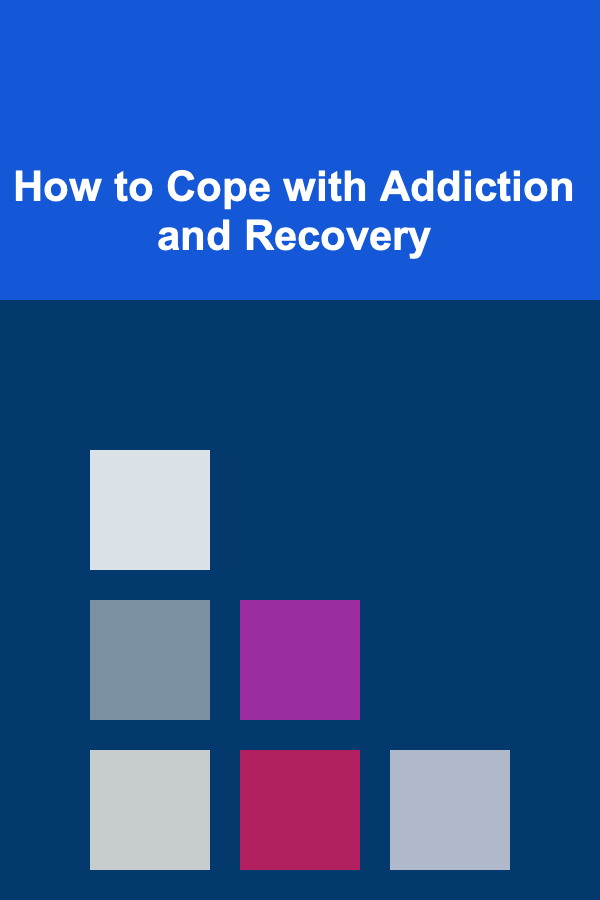
How to Cope with Addiction and Recovery
ebook include PDF & Audio bundle (Micro Guide)
$12.99$6.99
Limited Time Offer! Order within the next:

Addiction is a deeply complex and challenging condition that affects millions of people worldwide. Whether it's substance abuse, behavioral addictions, or other compulsive behaviors, addiction can take a severe toll on individuals, families, and communities. Coping with addiction and embarking on the journey of recovery can feel overwhelming, but it is entirely possible with the right approach and mindset.
This article explores various aspects of addiction, its impact on life, and the necessary steps to cope with it. We will also delve into effective recovery strategies, support systems, and the psychological, emotional, and physical challenges faced during recovery. Understanding these facets is essential to not only healing oneself but also offering support to others who are struggling with addiction.
Understanding Addiction
What Is Addiction?
Addiction is a chronic, relapsing condition characterized by the compulsive engagement in rewarding stimuli, despite adverse consequences. This can involve substances like alcohol, drugs, or nicotine, or behaviors such as gambling, eating, or even excessive use of technology. The core element of addiction is the inability to control one's use of the substance or behavior, which leads to physical, psychological, and emotional consequences.
At a biological level, addiction alters the brain's structure and function. The brain's reward system, particularly the release of dopamine, is disrupted, leading individuals to seek out the addictive substance or behavior more frequently, even when they know the risks involved.
The Cycle of Addiction
Addiction is often referred to as a cycle due to the way it repeats itself. The cycle typically involves:
- Initial use: This may be driven by curiosity, peer pressure, or emotional pain relief.
- Regular use: The individual may feel a sense of pleasure, control, or relief from stress.
- Tolerance: Over time, the individual needs more of the substance or behavior to achieve the same effect.
- Dependence: The body becomes reliant on the substance or behavior to function normally.
- Addiction: The individual loses control over their use, leading to physical, psychological, and social consequences.
- Relapse: Even after periods of abstinence, individuals may fall back into the cycle due to triggers or stress.
Understanding this cycle is crucial for anyone seeking recovery, as it highlights how deeply ingrained addiction can become in a person's life.
The Different Types of Addiction
Addiction can manifest in various forms, and understanding the type of addiction is vital for developing an effective treatment strategy. These types include:
- Substance addiction: This includes addiction to alcohol, drugs (both prescription and recreational), nicotine, and other substances.
- Behavioral addiction: These involve compulsive behaviors like gambling, shopping, gaming, or even eating.
- Co-occurring disorders: Often, addiction is linked with mental health disorders such as anxiety, depression, or PTSD, which can make recovery more complicated.
The Impact of Addiction
Addiction doesn't only affect the individual. It has a far-reaching impact on relationships, careers, and overall quality of life. Some of the effects of addiction include:
- Physical health deterioration: Addiction can lead to severe health problems, such as liver damage, heart disease, or respiratory issues.
- Mental health issues: Many addicts experience depression, anxiety, paranoia, or mood swings.
- Relationship damage: Addicts often struggle to maintain healthy relationships due to dishonesty, secrecy, or erratic behavior.
- Financial consequences: Addiction can lead to job loss, legal issues, and financial instability due to the constant need for the addictive substance or behavior.
- Legal issues: Illegal drug use or other behaviors can lead to criminal charges, which further complicate the addict's life.
The Stigma of Addiction
One of the major obstacles in addiction recovery is the stigma attached to the condition. Many individuals struggling with addiction feel ashamed or embarrassed about their behavior, which can prevent them from seeking help. This stigma is often rooted in society's misconception of addiction as a moral failing, rather than recognizing it as a medical condition that requires treatment and understanding.
Coping with Addiction
Acknowledging the Problem
The first step in coping with addiction is acknowledging that there is a problem. This is often the hardest part of recovery, as it requires vulnerability and self-awareness. Many individuals suffering from addiction spend years in denial, not recognizing the extent of their issue or trying to justify their behavior.
Seeking Help
Once an individual acknowledges their addiction, the next crucial step is seeking help. This may come in the form of:
- Professional therapy: Addiction counselors and psychologists can help identify the root causes of the addiction and provide coping strategies for managing triggers and cravings.
- Medical support: In some cases, medical intervention may be necessary to address withdrawal symptoms or provide medications to manage cravings (e.g., methadone for opioid addiction).
- Support groups: Connecting with others who understand what you're going through is often an essential part of recovery. Groups like Narcotics Anonymous (NA) or Alcoholics Anonymous (AA) offer a space for individuals to share their experiences and receive support.
Developing Healthy Coping Mechanisms
Coping with addiction requires developing new, healthy coping mechanisms that replace the destructive patterns of behavior. These might include:
- Exercise: Physical activity can improve mood and help reduce stress, making it a useful tool in addiction recovery.
- Mindfulness and meditation: Practices like mindfulness can help individuals manage cravings and become more aware of their emotional triggers.
- Healthy hobbies: Engaging in hobbies, whether it's painting, writing, or gardening, can provide a sense of fulfillment and distract from the urge to engage in addictive behaviors.
Identifying Triggers and Avoiding Relapse
An essential component of managing addiction is identifying triggers and developing strategies to avoid them. Triggers can be anything from stressful situations, certain people, or emotional pain. By recognizing these triggers, individuals can create coping strategies to deal with them without turning to the substance or behavior they are addicted to.
Some common relapse prevention techniques include:
- Avoiding risky situations: If bars or certain social settings encourage drinking, avoiding them can help maintain sobriety.
- Building a support network: Having a support network of sober friends, family members, or group members can provide encouragement and accountability.
- Developing a routine: A structured routine can help reduce the chaos that often accompanies addiction and provide a sense of control over one's life.
Self-Care and Emotional Health
Recovery isn't just about quitting an addictive substance or behavior; it's about healing emotionally and mentally. Self-care plays an integral role in the recovery process. Practices like:
- Getting enough sleep: Addiction can disrupt sleep patterns, so making sleep a priority helps the brain and body heal.
- Eating well: A balanced diet nourishes the body and improves mental clarity.
- Engaging in therapeutic activities: Journaling, therapy, and creative expression can help individuals process emotions in a healthy way.
Recovery Strategies
Detoxification and Rehabilitation
For many individuals, the first step in recovery is detoxification, where the body is cleared of addictive substances. Detox is often done under medical supervision, especially for substances like alcohol or opioids, where withdrawal symptoms can be severe or even life-threatening.
After detox, many people enter a rehabilitation program, which provides structured support and guidance to help individuals stay clean. These programs typically include:
- Individual therapy: One-on-one sessions with addiction counselors help individuals explore the emotional and psychological aspects of their addiction.
- Group therapy: Group sessions allow individuals to share their experiences and receive feedback from others.
- Family therapy: Addiction often impacts the entire family, and family therapy helps rebuild relationships and improve communication.
Long-Term Maintenance and Aftercare
Recovery doesn't end after detox or rehabilitation. It's a lifelong process that requires ongoing effort and commitment. Aftercare programs provide continued support, often through outpatient therapy, sober living environments, or 12-step programs.
Key elements of long-term recovery include:
- Continual therapy: Regular check-ins with a therapist or counselor can help individuals stay on track.
- Building resilience: Strengthening emotional and psychological resilience is essential for navigating life's challenges without turning to addictive behaviors.
- Staying connected: Maintaining relationships with sober support networks can prevent isolation and provide a sense of belonging.
The Role of Faith and Spirituality in Recovery
For many people in recovery, faith and spirituality can play a significant role in healing. Whether through religious practices or a broader sense of spirituality, connecting to a higher power can offer individuals strength, purpose, and guidance. Many 12-step programs incorporate spiritual elements to help individuals find peace and meaning in their lives.
Conclusion
Coping with addiction and navigating the recovery process is a challenging, often lifelong journey. It requires a deep understanding of the underlying causes of addiction, as well as the development of new coping strategies, healthy habits, and support systems. By seeking professional help, identifying triggers, and focusing on emotional healing, individuals can break free from the grip of addiction and build a new, fulfilling life in recovery.
Recovery is not a linear process, and setbacks may occur, but with the right tools, support, and determination, anyone can overcome addiction and achieve lasting recovery. Whether for yourself or someone you love, remember that healing is possible, and every step towards recovery is a victory.
Reading More From Our Other Websites
- [Home Budget 101] How to Budget for Home Repairs: Avoiding Costly Surprises
- [Home Family Activity 101] How to Make Your Own Slime with Kids
- [Mindful Eating Tip 101] Best Strategies to Teach Children Mindful Eating Habits at Home
- [Home Staging 101] How to Stage Your Home's Outdoor Spaces to Attract Buyers
- [Home Space Saving 101] How to Utilize Vertical Storage Solutions in Small Spaces
- [Home Budget 101] How to Decorate Your Home on a Budget: Creative and Low-Cost Ideas
- [Home Cleaning 101] How to Quickly Declutter Before You Clean and Prepare Your Home for Guests After a Party
- [Personal Care Tips 101] How to Apply Hair Mousse for a Light, Fluffy Finish
- [Personal Care Tips 101] How to Moisturize Your Skin with Body Lotion After a Shower
- [Personal Care Tips 101] How to Evaluate the Best Teeth Whitening Strips for Your Needs

How to Guide Employees Through Health Benefits Enrollment
Read More
How to Make the Most of Your Home Renovation Timeline
Read More
How to Mix Vintage and Modern Items for Unique Decor
Read More
How to Plan Meaningful Activities with Your Family
Read More
How to Utilize Smart Dust and Sensor Networks
Read More
How To Drive Engagement with Interactive Marketing
Read MoreOther Products

How to Guide Employees Through Health Benefits Enrollment
Read More
How to Make the Most of Your Home Renovation Timeline
Read More
How to Mix Vintage and Modern Items for Unique Decor
Read More
How to Plan Meaningful Activities with Your Family
Read More
How to Utilize Smart Dust and Sensor Networks
Read More